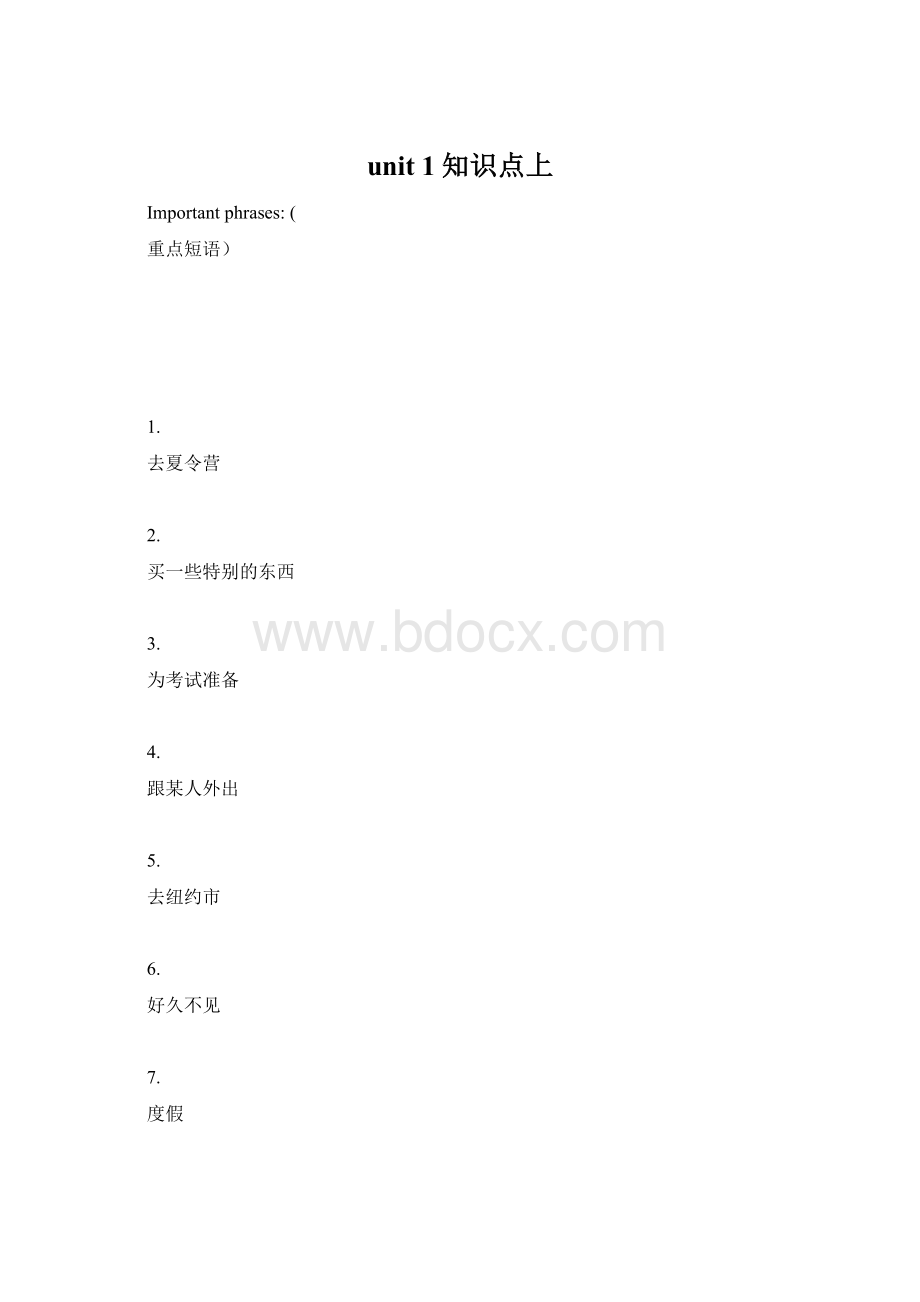unit 1知识点上.docx
《unit 1知识点上.docx》由会员分享,可在线阅读,更多相关《unit 1知识点上.docx(33页珍藏版)》请在冰豆网上搜索。

unit1知识点上
Important phrases:
(
重点短语)
1.
去夏令营
2.
买一些特别的东西
3.
为考试准备
4.
跟某人外出
5.
去纽约市
6.
好久不见
7.
度假
8.
去某个有趣的地方
9.
大多数时间
10.
给母鸡喂食
11.
除
—
外一无所有
12.
当然,自然
13.
似乎有点无聊
14
记日记
15.
令人愉快地活动
16.
到达
17.
决定去海边
18.
尝试滑翔伞运动
19.
感觉像一只小鸟
20.
想要骑车
21.
中国商人的房子
22.
在过去
23
许多古老的建筑
24
步行到山顶
25.
开始下雨
26.
等了一个多小时的火车
27.
下大雨
28.
忘记带一把雨伞
29.
又湿又冷
30.
因为恶劣的天气
31.
带着足够的钱
32.
足够大
33.
好像有点饿
34.
与
—
一样好
35
不如
----
好
36.
照了相当多的相片
37.
停下来喝水
38.
继续前进
39.
激动地跳跃
40.
二十分钟后
41.
如此
---
以至于
42.
升起
43.
发现
--
44.
尝起来很好吃
45.
尽力去做某事
46.
停止做某事
47.
不喜欢做某事
48.
继续做某事
49.
一碗米饭
50
为某人买某物
重点句子
where did you go on vacation?
go on vacation
去度假
2
.
Visited my uncle
重点
:
visit
为及物动词,
“拜访,探望,参观,游览”后接人或地点
改错
Did you visit in china?
3. Did you buy anything special?
1
)
buy
的过去式为
bought
buy sth.for sb.=buy sb sth.
我为
Tom
买了一个礼物
2
)
anything
不定代词“某物,某事”主要用于疑问句和否定句中
一旦
anything
用于可定句中,则意为“任何事,任何东西”
Eg You can ask me anything you want to know
3)
★形容词修饰不定代词要后置
4.Oh,did you go anything interesting
?
这是一般过去时中不含
was/were
的句子在变一般疑问句时,需用助动词
did
。
Anywhere
用作副词,
“任何地方”
辨析:
anywhere
和
somewhere
anywhere
“任何地方”否定句和疑问句
I can
’
t find it anywhere
Somewhere
“在某出”
,常用语肯定句
I lost my key somewhere near here
5 we took quite a few photos there
take photos ―
拍照
‖
quite a few
与
quite a little
quite a few
相当多
修饰可数名词复数
quite a little
许多
相当多
修饰不可数名词
6 most of
―
大多数,大部分
‖
作主语时谓语动词取决于后所修饰的名词
7.Everything tasted really good
!
Taste
为连系动词
“尝起来”
回忆五个感官动词它们分别是:
、
、
、
。
后需加什么词性的词?
Eg
—
Does the soup taste
?
---Yes It
’
s hot,but really delicious.
A badly
B
well
C
good
D
bad
8.How did you like it?
你觉得它怎么样?
=What do you think of
…
=How do you feel about
9Did you go shopping?
go+doing
‖
去做某事
‖
运动或休闲
go climbing
go hiking
go camping
10 I went to a friend
’
s farm in the countryside with my family
friend
’
s farm
名词所有格
单数名词加
’
s
复数名词词尾没有
s
也要加
’
s
Lily
’
s pen women
’
s shoes
复数名词以
s
结尾的
直接加
’
两个名词并列
若都有
’
s
表示分别有,
若一个有
’
s
表示共有
11 The only problem was that there was nothing much to do in the evening but read
nothing much to do
“没什么事可做”
nothing
…
.but
…
“只有”
but
后跟动词原形
12 Still no one seemed to be bored
Seem
用法
seem+
形容词“看起来”
seem+ to do
‖
好像做某事
‖…
I seem to have a cold
It seems/seemed+that
―
似乎
‖
bored
与
boring
的区别
13 I arrived in Penang in Malaysia this morning
arrive
不及物动词
后加
in
(大地方
国家
省
市)
at(
小地方
机场
商店等
)
4
…
.so we decided to go to the beach
decideto do
“觉得去做某事”
decide+
疑问词
+
不定式
decide when to leave
14
try doing
尝试做
try to do
尽力做
15 feel like
1)
‖
给
…
.
的感觉;感受到
‖
I feel like I was a bird
2)
想要
…
..
相当于
would like
后接名词、代词、动名词
Do you feel like taking a talk with me .
16 I wonder what life was like here in the past
wonder
为及物动词“想知道”后接
who what why
17
enjoy doing sth.
喜欢做某事
want to do sth.
想去做某事
start doing sth.
开始做某
事
stop
doing
sth.
停止做某事
dislike
doing
sth.
不喜欢做某事
keep
doing
sth.
继续做某事
18 what a difference a day makes!
what
引导的感叹句与
how
引导的感叹句的区别:
different
与
difference
区别:
19we waited over an hour for the train because there were too many people
1)wait for
“等候”
2)over
“超过,多于”相当于
more than
3)
too many
接名词复数
“太多”
too much
不可数名词“太多”可修饰动词
Don
’
t talk too much
much too
‖
太
‖
The hat is much too big for me
19
because of
名词代词动名词不可加句子
because
加从句
20
巧记
enough
的句中位置
修饰名词
,可前
可后
修饰副词形容词只后置
I know him well enough
21
21Why not do. sth.?
为什么不做
……
呢?
22 so+adj.+that+
从句
如此
……
以至于
……
造句我们学校如此美丽以至于每个人都喜欢
23everyone in our class took a bag with some food
with
‖
具有
带有
‖
Eg I
’
d like some coffee
milk
A with
B in
C
toD for
一般过去时
动词过去式变化规则:
1
.一般在动词末尾加
-ed
,如:
pull-pulled, cook-cooked
2
.结尾是
e
加
d
,如:
taste-tasted
3
.
末尾只有一个元音字母和一个辅音字母的重读闭音节,
应双写末尾的辅音字母,
再加
-ed
,
如:
stop-stopped
4
.以
―
辅音字母
+y‖
结尾的,变
y
为
i
,再加
-ed
,如:
study-studied
5
.不规则动词过去式:
am,is-was
are-were, do-did,
see-saw,
say-said
give-gave,
get-got,
go-went,
come-came,
have-had, eat-ate,
take-took,
run-ran,
sing-sang,
put-put, make-made,
read-read,
write-wrote,
draw-drew,
drink-drank, fly-flew,
ride-rode,
speak-spoke,
sweep-swept,
bu
y-bought
swim-swam,
sit-sat
bring--brought
can-could
cut-cut become-became
begin
-began
draw-drew
feel-felt
find-found
forget-forgot
hear-heard
keep-kept
know-knew
learn-learnt
(
learned
)
leave-left
let-let
lose-lost
meet-met
read-read
sleep-slept
speak-spoke
take-took
teach-taught
tell-told
write-wrote
wake-woke
用所给动词的适当形式填空
1.Tom and Mary ___________ (come) to China last month.
2.Mike _________________(not go) to bed until 12 o
’clock last night. So I _______ (get )
up late.
3.Mary __________ (read) English yesterday morning.
4.There _________ (be) no one here a moment ago.
5.I ___________ (call) Mike this morning.
6.I listened but ___________ (hear) nothing.
7.Tom ___________ (begin) to learn Chinese last year.
8.Last week we _________ (pick) many apples on the farm.
9.My mother ________________ (not do) housework yesterday.
10.She watches TV every evening. But she _______________ (not watch) TV last night.
11.________ your father ________ ( go ) to work every day last year?
12.
—
What time _______ you _______ (get) to Beijing yesterday?
—
We __________ (get) to Beijing at 9:
00 in the evening.
13.What __________ (make) him cry (
哭
) just now?
14.Last year the teacher ___________ (tell) us that the earth moves around the sun.
15.There ____________ a telephone call for you just now. (be)
16.There __________ not enough people to pick apples that day. ( be)
17.There _____________ any hospitals (
医院
) in my hometown (
家乡
) in 1940. ( be not)
18.There ____________ enough milk at home last week, wasn’t there?